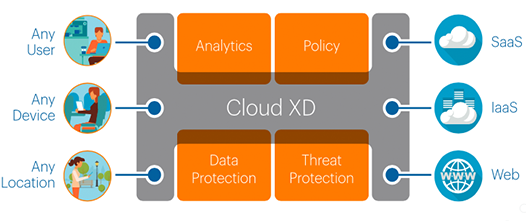Netskope Security Cloud Overview
The Netskope Security Cloud helps the world’s largest organizations take full advantage of the cloud and web without sacrificing security. The patented Cloud XD technology eliminates blind spots by going deeper than any other security provider to quickly target and control activities across thousands of cloud services and millions of websites. With full control from one cloud, our customers benefit from 360-degree data protection that guards data everywhere and advanced threat protection that stops elusive attacks.
Netskope Security Cloud can be deployed 100% in the cloud, as an on-premises appliance, or via a hybrid configuration that includes both. Cloud and web traffic is steered to Netskope for inspection using our patented all-mode traffic steering technology that provides several out-of-band and inline options ensuring that you get 100 percent coverage for users on premises, mobile, and remote. For users accessing cloud services, full coverage is provided whether a browser, mobile app, desktop app or sync client is used to access sanctioned or unsanctioned cloud services. TLS-encrypted cloud traffic is safely decrypted using the Netskope cloud-scale architecture as part of the traffic steering process.
Traditional security products are not well suited to the needs of today’s cloud
As people become increasingly mobile, collaborate more freely, and shift more of their data to the cloud, enterprises need security that governs use and protects data everywhere. Instead, most IT teams are still struggling with legacy security products that simply can’t contend with this new way people work. These legacy solutions don’t understand the language of today’s cloud and web, they only offer IT a binary policy choice — allow or block — and that frustrates both IT and users. Finally, these products present blind spots, putting your sensitive data at risk of loss and exposure.
Netskope Cloud XD

See cloud and web activities in real time
By mapping the API interactions of billions of transactions across tens of thousands of cloud services and millions of websites, the Netskope Cloud XD helps you understand cloud and web activities like “share,” “approve,” “edit,” “download,” “send,” “post,” “upload,” and more.
Netskope Cloud Confidence Index

The industry's only objective cloud services audit
The industry’s only objective assessment, the Netskope Cloud Confidence Audit™ is a complimentary service for cloud vendors to have the Netskope research team evaluate their service against the Netskope Cloud Confidence Index™ (CCI) criteria. The Netskope CCI is an objective measure of a cloud service’s enterprise readiness and is adapted from the Cloud Security Alliance (CSA) Cloud Controls Matrix (CCM). Enterprise customers use the Netskope CCI score to understand the appropriateness of cloud services for their organization, identify service gaps against their security and compliance requirements, and determine whether to allow services and identify compensating controls.
Shadow IT
Full visibility
Gain full visibility of your cloud services with an all-mode architecture capable of covering all cloud traffic whether your users are on premises or remote, using a web browser, mobile app, or sync client. Assess enterprise readiness of these cloud services with our objective Cloud Confidence Index (CCI) and calculate risk scores based on your organization’s usage.
Granular control
Only Netskope gives you granular visibility and control over all or your cloud services. Rather than take a coarse-grained approach by blocking services, set your security policies based on identity, service, activity, and data. Define policies based on the service category or the Cloud Confidence Level in the Netskope CCI. Choose from actions such as block, alert, bypass, encrypt, quarantine, and coach for policy enforcement.
Data Protection
Many cloud services make it easy to share, but those same capabilities can put your sensitive data at risk. Detect and protect your sensitive content as it moves in and out of sanctioned and unsanctioned cloud services with the industry’s most sophisticated cloud DLP and advanced data encryption.
Compliance
Understand activity-level usage of your cloud services and detect non-compliant behavior. Maintain detailed audit trails of all cloud activities, and ensure compliance by governing access to your cloud services based on deep cloud context. Enforce granular, activity-level or data-level policies to safely enable cloud services while complying with regulations.
